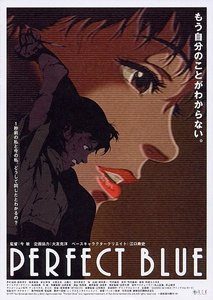
I wrote an article for the AllTheAnime blog reflecting on Perfect Blue as a horror film, while my Neo, Uncooked Media review of the 2013 Blu-ray release follows.
Following Cowboy Bebop, the fledgling label Anime Limited’s new release is another landmark from yesteryear – Perfect Blue, an anime horror film-cum-psycho thriller, made back in 1997. If you haven’t seen it, it has parallels with Black Swan, where Natalie Portman played a ballerina in mental meltdown. Certain fans insist Black Swan ripped off Perfect Blue, though we disagree; certainly Perfect Blue is smarter and scarier.
Perfect Blue’s protagonist is a woman idol singer, Mima Kirigoe, part of a frilly-frocked trio called CHAM. Whereas many anime would show Mima’s struggles getting in to the idol industry, the film starts with her getting out; she announces at a farewell concert that she’s going into acting instead. Her first role is on TV, in a serial about a serial-killer, where the writer doesn’t know how it’ll end (Lost fans will sympathise). Eventually the show opts for shock, with a graphic rape scene for Mima’s character. Mima agrees to do it, but is haunted by her visions of another Mima, decked out in CHAM gear and mocking this ‘filthy’ woman imposter…
Warning: Perfect Blue is disturbing, with horrendously raw scenes of sex and violence (sometimes appallingly mashed together). Its later scenes are a pile-up of fractured dreams and pick-your-reality wakings, where it can be surrealistically impossible to tell which bits are ‘actually’ happening. This is a film about mad people which goes mad, positioning the viewer as an unreliable observer trying to piece events together on the fly. Some viewers will find the film obnoxiously gimmicky, though it’s hard to deny the deftness of the opening scenes. These set Mima the ordinary woman against Mima the fantasy idol through quick switches and match cuts, zapping the character from a gaudy pop show into the mundane middle of a supermarket.
Mima keeps us in the film; a mostly passive, rather dim girl who still feels dimensional and believable, with a larger life suggested in her apartment clutter and changing Japanese accent (she switches to country dialect when her mum phones). People care about her, and not just moe-obsessed men; Mima has no present or potential boyfriend, and her big influences are wilful women. The violence meted against her is upsetting, but it’s not for ‘rapey’ kicks; compare how the women and men come out at the end of film.
In one respect, Perfect Blue (made, remember, in 1997) is glaringly dated, with Mima treating the Internet and fan blogs as new-fangled inventions. Yet the plot’s topicality is terrifying. Just think how many once-time ‘cute’ female celebs are having public meltdowns in their own multimedia ‘reality’ dramas. In Japan itself, no-one needs reminding what happens when a idol star tries to live her life as a flesh-and-blood woman. You only need google ‘AKB48’ and ‘Minami Minegishi.’
Watching the new Blu-ray, the picture quality doesn’t seem that different from the old DVD released by Manga, but there are two striking changes. The subtitles are far less obtrusive on this copy; and the picture ratio is different, without the black bars of the DVD but with slightly more picture at the ends of the screen.
Perfect Blue was the director debut of Satoshi Kon, whose life was cut tragically short in 2010; you may know him from his later works, Paranoia Agent and Paprika. Don’t expect visuals on their level. Perfect Blue’s opening minutes can even feel crude, yet you’ll see fine animation being used when it’s needed. (And some of the ‘crudity’ comes from Kon’s deliberate steering away from cutesy anime faces.) Get used to it, and be blown away by the crafted method in Perfect Blue’s madness.
